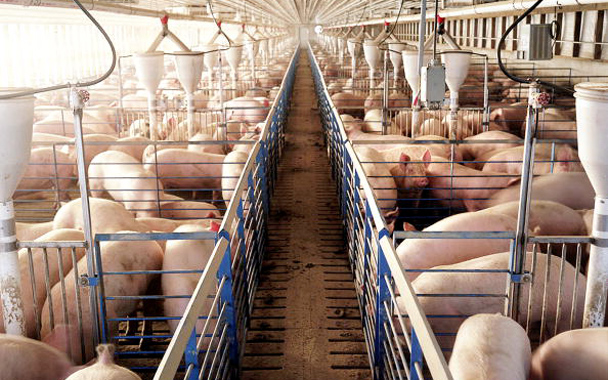Boo!
The goblins at the Environmental Protection Agency (EPA) handed out a great treat to the nation’s factory farmers on Halloween. The trick (and it’s a dirty one) is on the rest of us.
In a ruling that will go into effect next February, the EPA exempted concentrated animal feeding operations (CAFOs) from having to acquire permits that would limit water pollution—even though the animals they house excrete three times as much waste as the nation’s human population, according to the EPA’s own figures. To avoid having to get a permit, all CAFO operators have to do is say that they won’t discharge pollutants into waterways. And should one “accidentally” contaminate a river or stream, the EPA won’t bother to take enforcement action, according to the National Resources Defense Council (NRDC).
Needless to say, advocates for Big Ag are delighted. The National Pork Producers Council calls the ruling “tough but fair,” and the American Farm Bureau Federation hails it as a “substantial improvement in water quality protection.”
The folks at the NRDC, which successfully sued the EPA over earlier, even weaker water pollution control regulations in 2005, are decidedly less effusive. “Literally and figuratively, this rule puts the Bush Administration’s stamp of approval on a load of manure,” said NRDC lawyer Jon Devine, in a press release. In the same release, the Waterkeeper Alliance’s in-house attorney said, “Clearly, industry lobbyists are picking up last-minute deals intended to preserve their right to pollute for years to come.”
Junk Science at the FDA
Of course, the EPA is hardly alone in handing out goodies to corporate lobbyists in the waning months of the Bush administration. The Food and Drug Administration (FDA) has also been busy tearing apart our food supply’s safety net. One of the more gaping holes was ripped in August, when the agency fell all over itself in giving assurances that bisphenol A (BPA), a plastic compound that can disrupt human hormone function, was safe for use in baby bottles and other food containers, despite a considerable body of research to the contrary and bans in other countries.
But last week, an independent committee appointed by the FDA to review the recommendations slammed the agency’s decision. Among the problems the committee found:
· Some studies were inexplicably excluded from the FDA’s report.
· The report does not accurately reflect the uncertainties in its estimates of BPA’s effects.
· The FDA’s definition of an acceptable level of exposure is too high.
· Too little attention was paid specifically to the effects of exposure on infants.
Even the FDA allowed that these were “important questions,” and admits more research is needed. That, of course, will take time. Until then, the now thoroughly debunked assurances the agency gave consumers this summer remain in effect.
For anyone wanting to err on the side of caution while the FDA dithers, I have a few simple words of advice: Avoid plastic containers bearing the number 7 (located within the “chasing arrows” logo on the bottom of the container). They often contain bisphenol A.




 Pinterest
Pinterest


